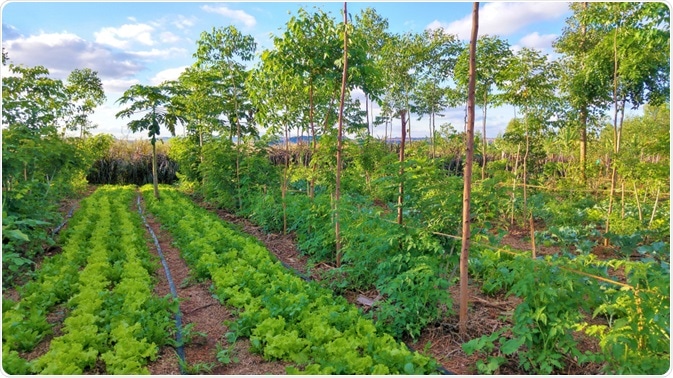The rapid and continuous growth in the global population has consistently increased the demand for agricultural produce. According to the United Nations, the global population might reach 10 billion by 2050. Thereby, to feed people at this scale, strategies to improve food production are urgently required.

Image Credit: Arthimedes/Shutterstock.com
Can Agriculture Harm the Environment?
In order to increase the agricultural produce, varied methods have been implemented which are not environmentally friendly. Scientists have stated that agriculture contributes to one-third of greenhouse gas emissions and uses 70% of freshwater resources. The practice of deforestation and water diversion to increase farmlands for increased agricultural produce has immensely affected the ecosystem. This practice harms wildlife and leads to the eradication of biodiversity-rich habitats.
Additionally, farmers tend to overuse chemical fertilizer and pesticides which have detrimental effects on the soil and groundwater. All these effects lead to climatic changes. Therefore, a negative cycle occurs, i.e., ill agricultural practice leads to climatic changes, and extreme climatic changes decrease agricultural production.
Strategies to Feed the Planet without Affecting the Climate
Several strategies have been undertaken to increase agricultural yield without affecting the climate. These strategies involve cultivating genetically engineered crop plants that have various biotic and abiotic resistance. The use of advanced technology also aids in sustainable farming.
Another important aspect that has been taken into serious consideration is the minimization of food waste. Some of the strategies that have been implemented or are in the process are discussed below:
Land-sparing and Land-sharing
A huge debate has been associated with “land-sparing and land-sharing”. The debate assumes a fixed target of agricultural production could be achieved via two approaches, i.e., high-yielding agriculture on a smaller land area (land-sparing), or low-yielding agriculture on a larger land area (land sharing). The land-sparing method involves sparing land such that wild animals, birds, and other species thrive well in the wild nature.
The group of scientists who believe in the “land-sparing” approach stated that this approach will help rejuvenate biodiversity as most tropical forest species cannot thrive in an agricultural field. In contrast, “land-sharing” promotes wildlife-friendly agriculture, without hampering the agricultural yield.

Image Credit: anacotrin/Shutterstock.com
Agro-ecological Methods
Agro-ecological methods, e.g., agroforestry, integrated pest management, and livestock integration can promote a sustainable model of agriculture. The agroecological methods of cultivation could enhance resilience to drought, pathogenic infestations, floods, hurricanes, and climate change. It will preserve soil health and enhance both the quality and quantity of agricultural produce. Further, sustainable agriculture could support the livelihoods of local people living in the vicinities of protected areas.
Stabilize the Agricultural Land Footprint
One way that can prevent further expansion of agricultural land into natural habitats is by implementing strong environmental policies by governments across the world. Also, controlling livestock production, which occupies one-third of the terrestrial land surfaces and consumes a substantial amount of grain, could be another method.
Minimizing Food Waste
According to the United Nations, one-third of the entire food produced is wasted due to rotting in the bins of consumers and retailers or spoiled during transportation, storage, and harvesting practices. Owing to scientific advancements, the fruit aging process can be reduced.
For example, bananas produce ethylene gas which enhances the process of ripening. Scientists have successfully edited the genome of bananas such that their ethylene production is reduced. This scientific advancement has minimized fruit wastage and also enhanced the shelf life of bananas in the supermarket.
In most parts of the world, such as the European Union, gene-edited crops are highly regulated with an extensive approval process. Instead of worrying about increasing the crop yield, various strategies to reduce food wastage must be implemented. This could ensure less expansion of farmlands into rich biodiversity forests.
Additionally, preventing food waste indirectly involves a reduction in the wastage of energy, water, and labor required for producing it. Another strategy is to stabilize the growing human population across the world.
Robotics and Farming
Robotics plays an important role in precision farming. Different types of robots have been designed for specific functions. For instance, one type of robot obtains images of crops in the field, which are then analyzed. After the analysis of various biotic and abiotic stresses that might be affecting the plants’ growth and development, the solution is assessed. The second type of robot is designed to apply the solution, for example, spraying pesticides at a target site only. This eliminates the requirement of blanket spraying fields or unnecessary overuse of chemical fertilizers and pesticides that have a detrimental effect on the soil and groundwater.
Scientists have also developed robots that are capable of planting as well as harvesting. Mobile robots for farming are more effective than conventional tractors. As the conventional tractors are extremely heavy, their rolling around the field makes the soil compact. A compact soil reduces the size of the pore that typically holds water and air, which is essential for soil microbes and ultimately plants’ development.
Other Strategies
Development of new models, associated with growing, processing, transporting, storing, and selling food products, are required. For instance, supermarkets could be encouraged to change labels to highlight the carbon or water footprint linked with a particular food item. Also, they could be introduced to modern technologies, such as biosensors that can help reduce food waste.
Controlling the world’s population could also help tackle the current problem. In some countries, such as Bangladesh, contraception is provided to the families that desire it. Effective family planning could improve the child’s and mother’s health and reduce poverty.
Last Updated: Feb 13, 2023